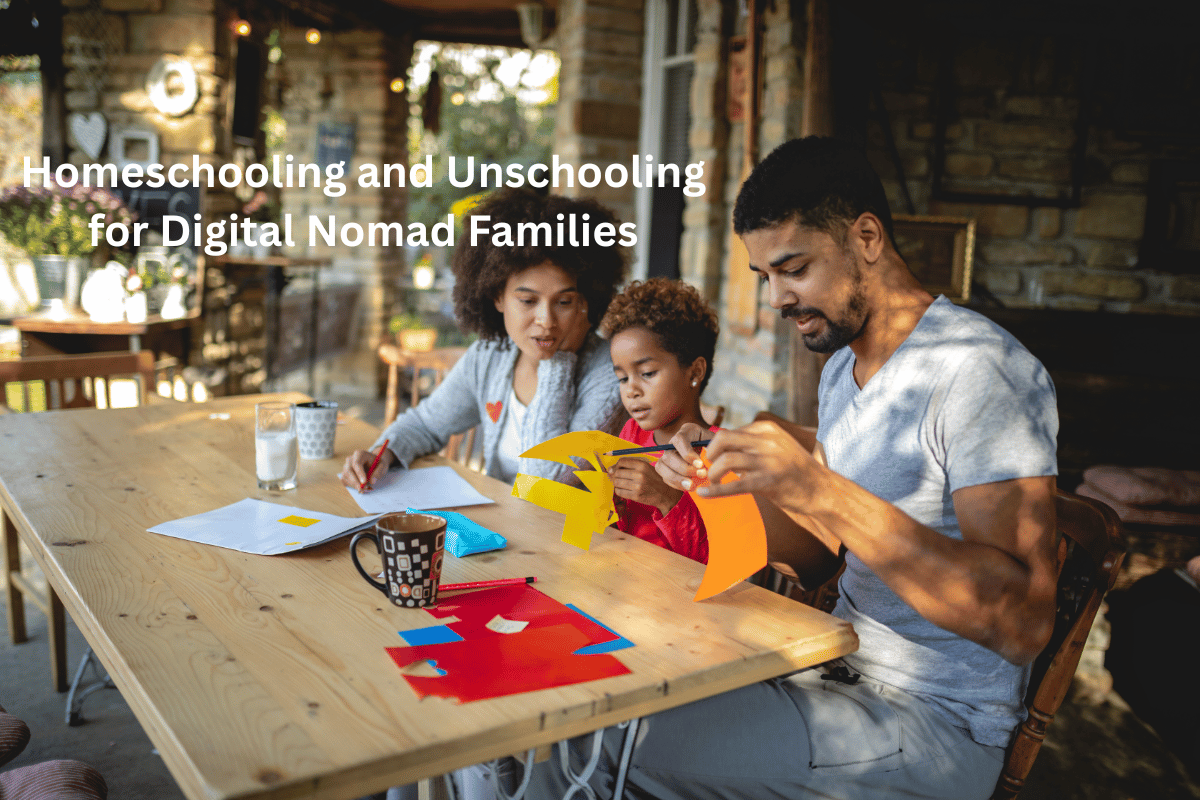Education on the Road: Homeschooling and Unschooling for Digital Nomad Families
The digital nomad lifestyle has brought a new way to teach kids—roadschooling. It lets families learn while traveling. At first, it might seem hard to teach kids on the move. But, there are many resources to help, from homeschooling to unschooling. These methods give kids a unique education that’s different from regular school.
Key Takeaways
- Roadschooling enables flexible education tailored to digital nomad families.
- Khan Academy is a popular resource among roadschoolers focusing on math education.
- Planning and maintaining a schedule is crucial for balance between travel and study.
- Partners should share schooling responsibilities and plan activities during working hours.
- Engaging with the roadschooling community provides valuable support and insights.
Introduction to Roadschooling and Digital Nomad Lifestyle
Roadschooling and the digital nomad lifestyle are exciting for many families. It combines traditional homeschooling with the benefits of traveling. Families on the road learn to be flexible and resourceful.
What is Roadschooling?
Roadschooling is perfect for families who love to travel. It blends traditional homeschooling with learning from experiences. About 3% of digital nomads choose this way of homeschooling.
Around 15% of homeschoolers need to get their curriculum approved. The best part of roadschooling is its flexibility. Parents can tailor education to their travel plans.
The Digital Nomad Family Experience
Being a digital nomad family means always discovering new things. These families use curricula like Sonlight and Singapore Math. They also use online resources and second-hand materials to save money.
About 10% of these families prefer worldschooling, which means learning through real experiences. This lifestyle combines traditional schooling with hands-on learning.
Families might spend months doing activities like snowboarding school. This approach helps kids become more adaptable, creative, and communicative. Even with the costs of RVs and travel, roadschooling is a rewarding choice.
Understanding Homeschooling for Digital Nomad Families
Homeschooling as a digital nomad offers both chances and challenges for families always on the move. Nikolaj Astrup started his digital nomad life with his family in 2012. His kids, almost 2 and 5 years old, do great in homeschooling. They learn with curiosity, independence, and a deep love for learning.
Traditional Homeschooling Methods
Traditional homeschool teaching methods are like what’s used in schools. They offer a structured learning path. Some families stick to a strict homeschooling plan, while others, like those in the Traveling Village project, mix structure with freedom.
For digital nomad homeschoolers, finding good educational resources for traveling families is key. Online tools and learning groups make it easier to get quality education. Parents can pick and choose what their kids need, saving money and keeping learning interesting.
Choosing the Right Homeschool Curriculum
Choosing the right homeschooling curriculum is important for digital nomad families. They look for flexibility, full coverage, and a good fit for their child’s learning style. Some mix traditional learning with unschooling, focusing on what sparks curiosity and real-life experiences. It’s also important to know the rules in each place you live.
Many parents look for the Montessori homeschool curriculum that combines structure with independence and encourages hands-on learning. This method adapts well to travel and changing environments, making it a popular choice for families on the move.
In Nikolaj’s Traveling Village, learning is more than just books. It’s about playing, talking, exploring, and getting involved in the world. This way, kids grow not just in school subjects but also emotionally and socially. They get a full, enriching education.
Exploring Unschooling Philosophy
The unschooling philosophy is an alternative way to learn that’s different from traditional homeschooling. It lets kids take the lead in their education, using their own curiosity and interests. This approach focuses on real-life experiences and exploration, not just a set curriculum. It gives kids more control over their learning, making it unique and suited to their needs.
What is Unschooling?
Unschooling means kids get to choose what and when they learn. There’s no set curriculum. Instead, they dive into topics that catch their eye. This method is part of radical unschooling, which applies the child-led approach to all parts of life. It blurs the line between learning and everyday activities.
“Unschooling lets children explore their passions without the constraints of traditional schooling,” notes Pat Farenga, a prominent advocate of this approach.
More and more, digital nomad families are choosing unschooling. They value a flexible way of learning that fits their lifestyle. This lifestyle offers unique learning chances that aren’t found in traditional classrooms.
Benefits of Unschooling
Unschooling has many advantages:
- Independence: Kids learn to manage their own learning, boosting their motivation and decision-making.
- Critical Thinking: By focusing on what they love, kids develop deep thinking and critical thinking skills.
- Personalized Education: Unschooling tailors education to each child’s interests and pace.
Unschooling isn’t right for every family, but it’s a great choice for many. Some worry about social skills, but many unschooled kids do well in college. Each family’s journey is unique, offering valuable lessons along the way.
Worldschooling: A Global Approach to Education
Worldschooling combines travel with learning, making the world a classroom. It lets families learn through different places, cultures, and histories. This way, kids get to see the world and learn from it.
It’s like homeschooling but on a global scale. Each place you visit becomes a chance to learn something new. This method helps kids become aware of the world and its cultures.
Defining Worldschooling
Worldschooling uses the world as a classroom. Kids learn by experiencing new things during family trips. Parents choose this way of learning for their kids.
Families might travel slowly through Morocco or backpack in Southeast Asia. This type of education is for those who travel long-term, not just on short breaks. Using tech like tablets and laptops can help with learning too.
The Benefits of Worldschooling
Worldschooling has many benefits for families who can travel and work flexibly. It lets kids dive into different cultures and places, making their learning richer. Parents can pick how they want their kids to learn while traveling.
This approach offers unique learning experiences that traditional schools can’t match. It builds a love for learning and prepares kids to be global citizens. Kids learn at their own pace, exploring the world and discovering new things.
Remote Learning Tools for Traveling Families
Traveling families often struggle to keep their kids on track with their schoolwork. Luckily, there are many online tools and digital resources made just for them. These tools make learning from anywhere possible and effective.
Online Learning Platforms
The Schoolio Learning Platform is a big help for traveling families. It offers:
- Customizable content that fits the child’s learning style and speed.
- Features for scheduling lessons around travel plans.
- Tools to track progress and celebrate achievements.
These online learning tools work with different homeschooling styles. They make sure kids learn all they need, from core subjects to extra activities. Plus, they work on many devices, so learning can happen anywhere.
Educational Apps and Resources
There are also many homeschooling apps and digital education resources for specific subjects. Apps like Khan Academy, Duolingo, and Mathletics make learning fun and interactive.
- Khan Academy: Offers lessons in math, science, history, and more.
- Duolingo: Teaches many languages, helping kids learn new tongues.
- Mathletics: Uses games and exercises to boost math skills.
These apps and tools help families keep up with schoolwork and explore new interests. This ensures kids get a well-rounded education.
Creating a Flexible Homeschool Schedule
Creating a flexible homeschool schedule is key for balancing travel and learning in a nomadic life. It’s important to plan lessons around travel plans and set regular study times. This approach helps families thrive in a changing environment.
Planning Lessons on the Road
Parents can make travel-friendly lesson plans to fit the family’s moves. Spending months in different places lets them add local culture to lessons. Online schools and learning based on interests can meet individual needs, making sure kids get a full education while traveling.
Balancing Travel and Education
It’s vital to keep a routine that fits the family’s travel life. Parents share teaching duties and mix local activities into lessons. For example, visiting cultural spots can teach history, and nature walks can be science lessons.
Having books, supplies, and good internet helps balance travel and learning. Being flexible is important, as this lifestyle means always learning from new places. This makes learning more exciting.
Places like the Manitoulin Worldschooling Community and Porto Grana Worldschool Hub offer special spaces for families. They have free WiFi, libraries, and kitchens, making learning and living together easier. These spaces help families manage their flexible homeschooling and travel plans smoothly.
Integrating Local Culture and Activities into Education
Roadschooling lets kids learn in a unique way by traveling. It gives them a chance to dive into different cultures and languages. This makes learning more exciting than staying in a classroom.
Using Travel as a Learning Tool
Travel is a great way for kids to learn. They can see what they’re studying up close. For instance:
- Maintaining educational journals to document their observations and reflections.
- Participating in local festivals, workshops, and community events.
- Exploring historical sites and landmarks to unearth rich local history integration.
This way of learning makes it real and helps kids think critically and be independent.
Incorporating Local History and Culture
Learning about the local history and culture of each place adds to a child’s education. This can be done by:
- Visits to museums and historical landmarks that provide context to lessons learned.
- Interactions with local residents to understand different traditions and ways of life.
- Learning regional languages and dialects to deepen cultural immersion.
By doing this, kids learn more than just from books. They get to experience history and culture firsthand. This gives them a richer understanding of the world.
Challenges and Solutions for Roadschooling Families
Roadschooling has many benefits, but it also comes with challenges. Families might struggle with legal homeschool rules, keeping up with school standards, and making sure their kids socialize. Let’s explore some big challenges and ways to overcome them while traveling.
First, it’s vital to know and follow the law on homeschooling. Look into your area’s laws and get help from groups like the Home School Legal Defense Association (HSLDA). In the UK, more kids are being homeschooled, showing a growing trend that also means more rules to follow.
Keeping up with school standards is tough. Mixing structured and flexible learning helps. For example, using homeschooling and worldschooling lets families learn in new ways. Parents like Daniel Prince show how to adjust schoolwork for a traveling life.
Getting kids to socialize is another big issue. They need to be around other kids to grow socially. Joining online groups and local events helps. Sites like Vagabondfamily.org connect over 100 traveling families. Activities like cooking classes and trekking make new friends and improve social skills.
Travel also offers hands-on learning. Visiting museums and doing volunteer work adds real-world learning. Philosopher Julian Baggini says traveling can be more valuable than regular school.
Technology is a big help for roadschooling families. Online learning tools and apps keep education consistent. These resources make it easier to handle the challenges of roadschooling.
In summary, planning well and being flexible are key when roadschooling. By understanding laws, using different learning methods, connecting with others, and using technology, families can make the most of their travels.
Connecting with the Roadschooling Community
Connecting with other roadschooling families is key for those traveling and learning on the go. Being part of roadschooling support networks and homeschooling communities helps a lot. Here, families share tips, advice, and resources. This way, they find information and make friends that last a lifetime.
Social Media Groups and Forums
Social media makes it easy for traveling families to meet up. Groups on Facebook, like “Roadschool Moms” and “Roadschooling – Families Homeschooling on the Road Group,” are great places to talk and get advice. WhatsApp groups also help with quick support.
“Podcasts like Roadschool Moms and The Homeschool Sisters provide weekly content to connect, inspire, and encourage roadschooling families.”
- FulltimeFamilies.com has been a go-to since 2010, offering guides, curriculum, and ways to connect.
- Blogs like Xscapers.com and WeirdUnsocializedHomeschoolers.com share tips and basics on roadschooling.
- Books like “RV Travel on a Budget: A Mother and Son’s Guide to Roadschooling the USA” give practical tips for traveling families.
Local and Global Networks
Connecting with groups near and far can make roadschooling better. Groups like Fulltime Families and Wonder Wherever We Wander have guides and tips for different places. They also plan meetups for families to meet and learn together.
- The Goza family, who have been roadschooling since 1992, share how to connect with local communities while traveling.
- Wanderschool has lots of resources on roadschooling, homeschooling, and more.
Being part of roadschooling support networks and educational networking can change the game for families looking for a richer, more connected roadschooling life.
Conclusion
Embracing nomadic education offers many benefits and challenges. It shapes the learning experience for digital nomad families in unique ways. With 2.5 million homeschoolers in the U.S., flexible education is becoming more popular.
For digital nomads, using technology is key. It helps stay connected to work and keeps up with school standards. This ensures a smooth mix of travel and learning.
Successful roadschooling means doing your homework on local homeschooling laws. These laws can change a lot from place to place. Using online tools like Khan Academy, Coursera, and Duolingo adds to the learning experience. These platforms offer customized courses for different ages.
Joining homeschooling groups online and in person is also important. It gives support and shared experiences. These help nomadic families with their educational journey.
Challenges include not having a regular routine, feeling isolated, and balancing work and life. But, the benefits are big. They include flexibility, a personalized education, and strong family bonds.
Encouraging a love for lifelong learning prepares kids for a changing world. It helps them think critically and be creative. Roadschooling shows how learning can be both wide-ranging and deeply personal. It sets a strong base for future success.
Source Links
- How to Roadschool Your Kids as a Digital Nomad Parent
- Schooling options for Nomadic family lifestyle
- Roadschooling: Education while traveling – An introduction in Homeschooling, Worldschooling, and Unschooling – Digital Nomad Family with Kids – Travel Blog
- Newschool Nomads – A family on the road living fulltime in an RV.
- Roadschool – Live the Family Travel Life – Wanderschool
- Homeschooling Insights from a Digital Nomad Family
- The Wanderlust Curriculum: How Digital Nomad Families are Schooling their Kids on the Road
- No title found
- How to Live Nomad Lifestyle with Children
- What is worldschooling? Everything you need to know
- Worldschooling: Our Complete Guide to Getting Started
- What is Worldschooling?
- Worldschooling: A Complete Guide 2023
- What is Worldschooling?: How Expats and Digital Nomads are Homeschooling their Children through Travel Experiences
- Worldschooling Communities & Hubs For Nomadic Families (2024)
- How to Become a Digital Nomad with a Family | Voyage Nomad
- A Directory of Worldschool hubs for nomad families and life-long learners
- Welcome to Worldschooling – Boston Tribe Travels
- A Comprehensive Guide to Global Education and Nomadic Living
- Ultimate Worldschooling Guide
- The rise of travelling families and world-schooling
- Roadschooling Resources
- About – Wanderschool
- How to Homeschool Your Kids as a Digital Nomad – Jorcus
- How to Homeschool/Unschool Your Children While Being a Digital Nomad — RebelHQ







